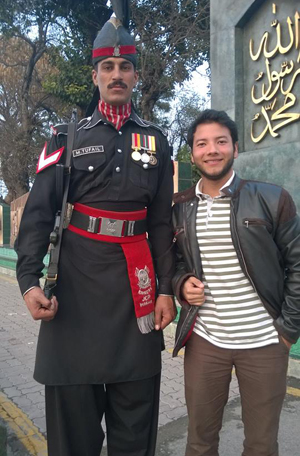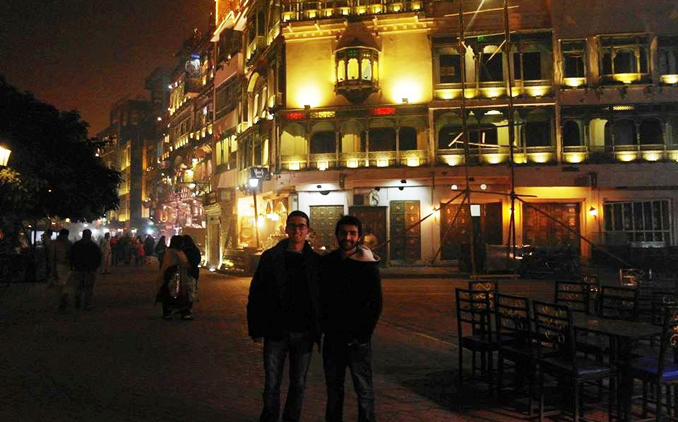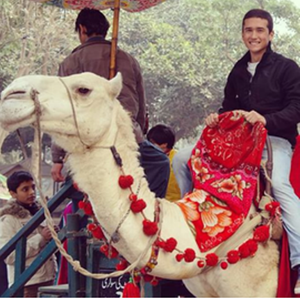Written by: Yusra Hayat
Posted on: April 21, 2015 | 
(l-r) Sergio and Henrique at Tandoor Restaurant, Lahore
Their ticket to Pakistan was an internship for a project called ‘Pakistan – Tum Hi Tu Ho’ (Pakistan – You Are the One), initiated by an international organization called AIESEC, which strives to provide a platform for the youth to discover and develop their potential.

Sergio and Henrique believed that they needed to immerse themselves in Pakistan – not in a project or a map in an atlas; not in a country deemed “dangerous” by world spectators, but in a nation made up of the bravest people, who soar high despite the unfortunate circumstances that plague their state.
The first thing that Sergio and Henrique noticed in this country was the fog. “I got to see and feel the fog; not the one that clouds peoples’ judgments about this country, but the one that compels you to grab a cup of a delicious beverage called chai on a chilly Lahore winter night”, remarked Sergio. For him, every experience in Pakistan left a profound mark on his memory and personality, whether it was the weekend in rural Punjab, when he saw animals being used for transportation for the first time, or the days spent in Murree, when he saw and touched snow for the first time. Sergio saw a stark difference between the wealthy and the poor: “In Colombia, the poor dress so well that you can never tell the disparity, but people here are honest, even with their appearances. It’s actually refreshing.”
He was truly mesmerized by the ancient heritage of Lahore, and claimed that he felt utterly insignificant in the presence of vast structures such as the Lahore Fort and the Badshahi Mosque. “The visit to old Lahore made me think of the world differently. We think we are the world and others are unimportant. We really need to open our minds and see people, countries, and the world for what they are, without getting caught in an ‘us versus them’ debate.” He stated that, just as Colombia was viewed as a country characterized by prostitution and drugs, Pakistan was categorized as hostile and terrorizing, and this created a dire and pressing need for people to actually visit these two countries and engage with them personally, before jumping to any conclusions about them.

Sergio believes that the reason why Pakistanis eat with their bare hands is that their meals are cooked with so much effort that utensils could never do justice to the texture, taste and feeling of their food. “While we eat to satisfy hunger and usually watch television during mealtimes, Pakistani meals are elaborate affairs where family and friends sit as a unit to share the warmth of human companionship.” Sergio expressed admiration for the positive obstinacy of the Pakistanis: despite the onset of globalization, a vast majority of the Pakistani community was adamant on preserving the rich culture of their country.

Henrique’s experiences in Pakistan made him even more determined to rebrand its image. “It’s a pity that this fascinating country is so misunderstood by the rest of the world.” He described Pakistan as one of the “richest” countries in the world. “Tell me, how can a country be poor, dangerous or gloomy, where so many languages in so many dialects are spoken, where weddings are grand occasions to celebrate love and happiness that go on for days, and where so many children are born into each family and cherished tremendously?”
Henrique’s journey to Pakistan altered him: he began to see similarities in differences and complexities in simplicities. He asserted that he had always envisaged Pakistan as a country filled with Muslims who formed a monolithic entity. “Standing in the Faisal Mosque, Islamabad, I saw the differences in peoples’ relationship with God, even under the umbrella of the same religion.” Understanding the reasons for animal slaughter during the festive occasion of Eid-ul-Azha, he began to see the link between all the religions of the world. By making friends in this part of the world, Henrique began to comprehend the differences between people, given their political, social, cultural and religious contexts, which could not be judged by any other standard.
Sergio and Henrique are agents of change who work to eliminate the flaws within this world system. They aspire to alter the misguided representation of Pakistan by engaging with the country and its people, physically and emotionally. Their sense of global citizenship, and subsequent projection of Pakistan in an entirely new light, is highly commendable.
You may also like: